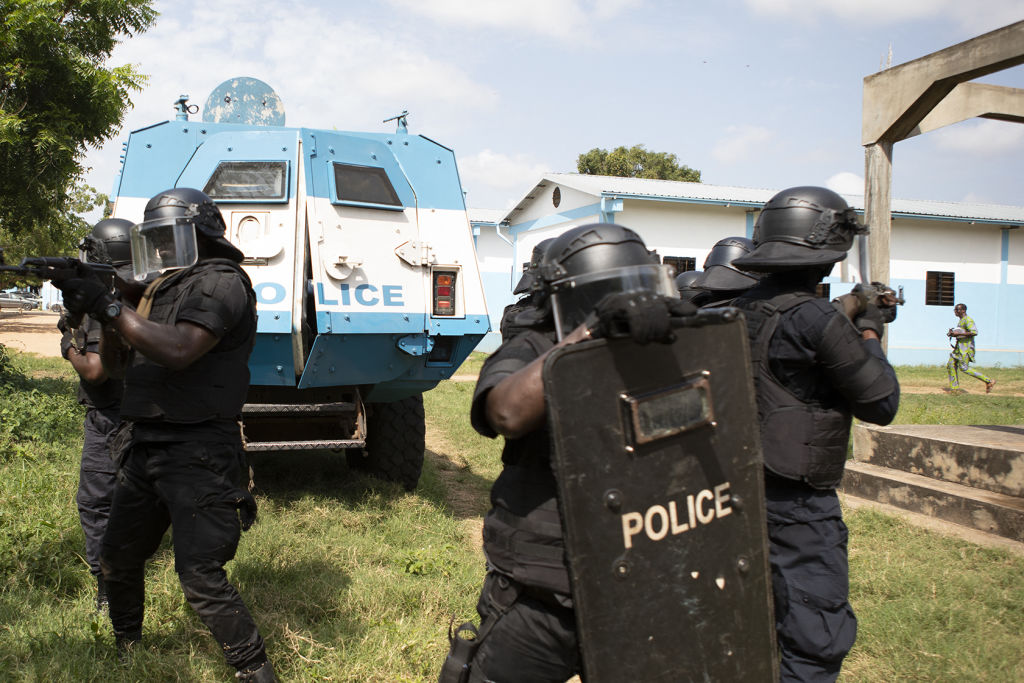The departure of three Sahelian nations from West Africa’s regional economic system at the end of January undercut collective counterterrorism efforts from Senegal to Nigeria. Restoring that system means overcoming mistrust between the nations of the Sahel and their neighbors, according to experts.
One starting point on that journey, according to analyst Eric Tevoedjre of Benin, may be a new diplomatic agreement between Burkina Faso, Mali and Niger, now operating as the Alliance of Sahel States (AES), and the Economic Community of West African States (ECOWAS).
“Maintaining good relations with the AES states is a strategic imperative for ECOWAS,” Tevoedjre wrote recently for the website Development and Cooperation. “The offer of diplomatic recognition could significantly improve the situation.”
Plagued for more than a decade by extremist groups and terrorist attacks, military groups in the three Sahelian nations overthrew their democratically elected governments in a series of coups starting with Mali in 2021. In 2024, the three countries’ leaders announced they would form their own mutual defense pact and pull out of ECOWAS, which they criticized as being ineffective against the terrorist threat.
The loss of the Sahelian nations raised questions about the future of ECOWAS as a collective security entity, Tevoedjre noted. Since that time, individual coastal nations have reached out to the AES on a bilateral basis but tensions with ECOWAS itself remain unresolved.
AES junta leaders pledged to rein in terrorists, particularly in the Liptako-Gourma region where the countries come together. So far, however, they have fared worse than their predecessors and the region now leads the world in terrorist activity, according to the Global Terrorism Index.
That terrorist activity along the region’s porous borders threatens security in coastal states, particularly along the lightly patrolled W-Arly-Pendjari wildlife park complex straddling the border Niger shares with Benin.
“Mistrust between the two organizations (ECOWAS and AES) prevents vital intelligence sharing and coordination of military operations to prevent certain territories from being used as fallback zones,” analyst Jeannine Ella Abatan wrote in March for the Institute for Security Studies. As a result, limited cooperation between the two groups is creating an environment where terrorist groups can thrive and spread, Abatan added.
A few weeks before the AES nations separated from ECOWAS, Jama’a Nusrat ul-Islam wa al-Muslimin (JNIM) killed 30 Beninese Soldiers at a base near the border with Burkina Faso and Niger. At the time, it was the deadliest terrorist attack in Benin’s history. Four months later, in April, another set of attacks along the border near W park eclipsed the earlier raid when JNIM fighters killed at least 54 security personnel. That same month, JNIM militants launched their first kamikaze drone attack on the Togolese military in the northern Savanes region bordering Burkina Faso.
Attacks in northern Benin and neighboring regions of Togo have come in response to stronger counterterrorism measures in both countries, according to Liam Karr at the Institute for the Study of War. JNIM’s campaigns in the coastal states are part of a strategy of creating bases from which it can launch attacks into Burkina Faso.
“A lack of counterterrorism coordination between Benin and its Burkinabe and Nigerien neighbors has likely created security gaps and facilitated JNIM’s offensive,” Karr wrote recently.
Benin’s independent intelligence, surveillance, and reconnaissance efforts haven’t been enough to replace the earlier multinational counterterrorism coordination available when the Sahelian countries were part of ECOWAS, Karr notes.
Regional security benefits from an economy of scale, according to analysts Michael Howard and Ethan Czaja. The AES is unlikely to have the resources to defeat its terrorist threat on its own, Howard and Czaja wrote in Small Wars Journal.
“Because ECOWAS and AES will not fund counterterrorism initiatives together, their individual projects will likely be far less effective or simply not be undertaken due to prohibitive start-up costs,” Howard and Czaja wrote. “The largest casualty of ECOWAS-AES non-cooperation will be border security.”
At the recent African Chiefs of Defense summit in Nairobi, Kenya, the continent’s top military leaders repeatedly emphasized the need to improve collective security efforts in areas such as West Africa, where terrorism in a handful of countries threatens the security of the entire region.
Toward that end, ECOWAS and the AES must move beyond coexistence and collaborate on their mutual threat from terrorism, Tevoedjre wrote.
“Political recognition would mark the beginning of a new era and pave the way for self-determined African cooperation instead of confrontation,” he wrote.

